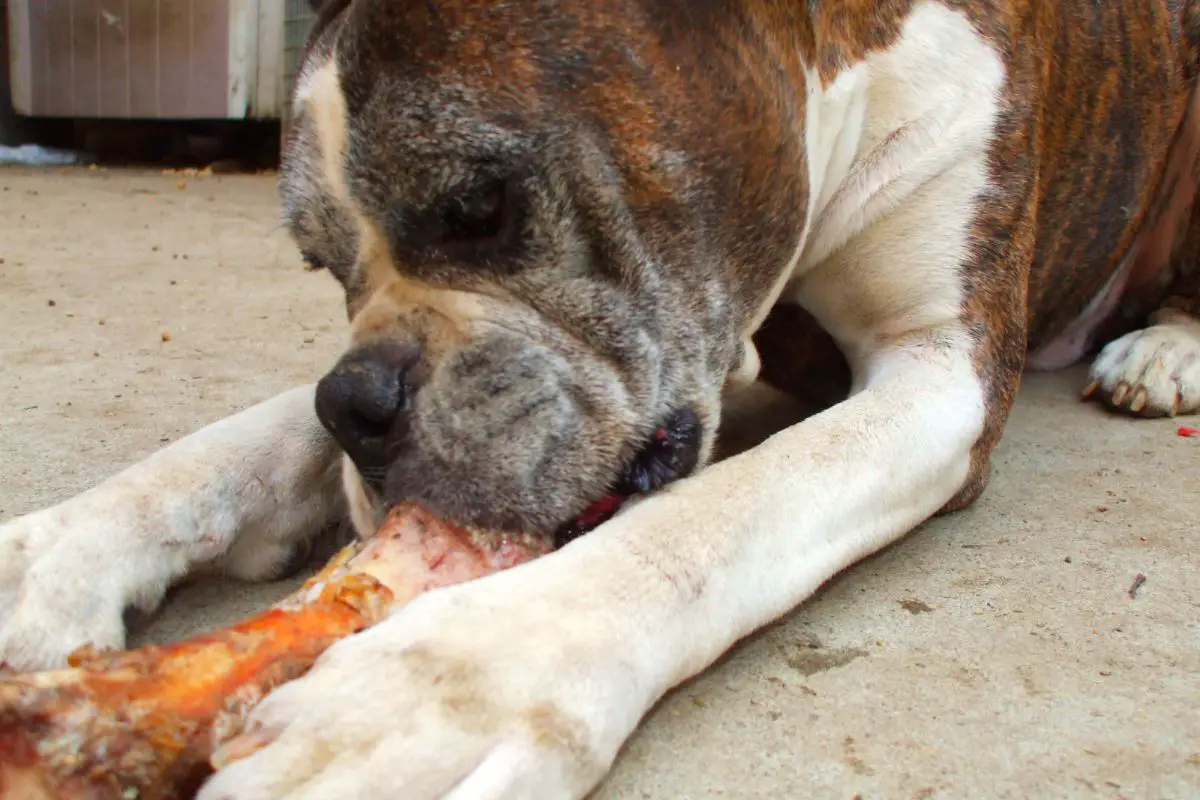This post contains affiliate links.
Vegetables are a great addition to any dog diet, and asparagus is one of the first things that come to mind. This yummy and nutrient-packed vegetable is safe and healthy for humans, and you may be wondering if your dog can also get a bite. So, can dogs eat asparagus?
Dogs can eat asparagus. It’s not toxic and is perfectly safe to add to their meal in small amounts. However, to reduce the risk of choking, diarrhea, and other intestinal disorders, it’s best not to serve it raw and lightly cook it and cut it into small pieces before serving it to your dog.
In the rest of this article, I’ll talk about when asparagus is safe for your dog to eat and when it’s not. I’ll also discuss the benefits of this vegetable, how you can safely incorporate it into your dog’s diet, and give you a few alternatives that you can try.
Table of Contents
Is Asparagus Safe for Dogs?
Asparagus is safe and non-toxic for dogs to eat. However, serving it to your pup raw can present a problem as it’s tough to chew and more difficult to digest. Even if your dog manages to chew it, there’s still a risk of choking.
Depending on your dog, raw asparagus may also cause diarrhea, gas, or vomiting. As a result, it’s best to cut it into small pieces and cook it before giving it to your dog.
When cooking asparagus for your dog, it’s best to avoid using any oil, butter, or seasoning as it can cause a different reaction. Boil or steam it in plain water instead.
Keep in mind that any form of cooking, whether boiling, simmering, or steaming, will reduce the level of some nutrients in vegetables, so it may be better to switch to a more dog-friendly vegetable like carrot or green beans.
Also, the fruits of asparagus, which are small red berries, are poisonous to both dogs and humans. According to North Carolina Cooperative Extension Service, young shoots of this vegetable may cause mild digestive issues. Although cooking it may reduce its toxicity.
There’s also a related plant called the asparagus fern. Although it’s associated with the common asparagus, it isn’t anything like a fern and doesn’t produce anything edible.
But it’s toxic to dogs, and you shouldn’t allow your furry friend anywhere near it. It can cause skin irritation on contact and vomiting and diarrhea when consumed. So, if you grow asparagus fern at home, be sure to fence up the garden to prevent your dog from reaching it.
The verdict: Asparagus is safe for dogs but in cooked form. However, the fruits and young shoots of this vegetable may cause intestinal discomfort in your furry friend if you allow them access to your asparagus garden. Considering the risks, serve it only in small amounts, and if you have a more dog-friendly vegetable, give that to your dog instead.
How Much Asparagus Can Your Dog Eat?
Just because asparagus isn’t toxic for your dog doesn’t mean you should throw everything in front of them. As with any food, moderation is key when giving it to your dog, especially if it’s not a regular part of their diet.
While the best source to know how much asparagus to feed your dog is your veterinarian, experts suggest following the 10% rule. In other words, treats like vegetables and snacks shouldn’t be more than 10% of your dog’s diet. It’s usually calculated in terms of the number of calories.
Asparagus doesn’t have to make up all the 10% mentioned here. You probably won’t grab a calculator every time to know precisely how many calories your dog is consuming, so it’s best to incorporate other dog-friendly veggies and snacks to ensure a well-balanced diet daily.
If you’re giving your dog asparagus for the first time, introduce it in bite-sized amounts and observe them for at least 12 hours. If there’s nothing unusual, you can gradually increase the serving size. However, if you notice anything strange, contact your vet immediately.
It’s also worth mentioning that asparagus can cause your dog’s urine to give off a foul smell. If you eat asparagus regularly, you’re probably familiar with this smell. The vegetable contains a unique compound known as asparagus acid that produces a very unpleasant odor in the urine when metabolized.
So, if your dog isn’t housebroken, you should feed them smaller amounts or probably feed them a different vegetable. The smell can linger around for days, and you could be in for a long smelly week!
Are There Any Benefits of Asparagus for Dogs?
Like most vegetables, asparagus has several nutritional benefits. It’s packed with key nutrients, vitamins, and minerals. It’s also low in calories, fat, and sugar, making it an excellent snack for your dog.
So, if you’re wondering if asparagus has any benefits for your furry friend, here are some reasons why you may give it to them.
Aids Metabolic Functions
Asparagus is high in folic acid, which is essential for the metabolic functions in your pup’s body, such as red blood cell production, DNA synthesis, cellular division, and neural development. It’s generally required in small amounts, and asparagus can contribute to your dog’s intake.
Supports Growth and Cell Function
This vegetable is rich in vitamin A and E, responsible for your dog’s fetal development, eyesight maintenance, immune function, cell growth, and fat metabolism. While your dog may already be getting these vitamins from other food sources, asparagus can be a great addition to their diet.
Supports Digestive Health
Asparagus contains both forms of fiber: soluble and insoluble. The proportion of insoluble fiber is higher in this vegetable, which helps maintain regular bowel movements and produce firm, formed stools. So, if your dog is ever struggling with constipation, asparagus can help in treating it.
It also contains some insoluble fiber, which promotes the growth of friendly bacteria in the guts. Dietary fiber can also help your dog lose weight as it creates a feeling of fullness when consumed.
Ensures Proper Body Function
Asparagus contains potassium, an electrolyte essential for the normal function of your dog’s heart, muscles, and nerves. It also contains calcium and phosphorus, which are vital for strong bone and teeth development and blood clotting, muscle building, and proper function of the nervous system.
Other minerals like copper and iron also help with bodily functions like enzyme production and function, brain function, red blood cell formation, skin and hair pigmentation, nerve impulses, and other cellular processes.
Packed With Vitamins
Asparagus is loaded with vitamins necessary to help your dog maintain a healthy life. It’s a good source of vitamins A, B6, C, E, and K, which perform various functions such as hormone regulation, red blood cell function, glucose generation, bone development, muscle growth, eye maintenance, etc.
It also contains thiamine or vitamin B1, which is essential for carbohydrate metabolism, energy regulation, and healthy organ heath.
Good Source of Antioxidants
One of the many vitamins in asparagus is vitamin C, which is an important antioxidant. Although dogs produce vitamin C on their own, supplementing it has been shown to produce benefits. It helps in fighting free radicals, reduces inflammation, and prevents chronic diseases.
Asparagus also contains glutathione, flavonoids, and polyphenols, which also help ward off free radicals and improve the overall immune system.
How To Serve Asparagus to Your Dog
As mentioned earlier, you need to cook asparagus before giving it to your dog. Cooking it will reduce the risk of choking and digestive disorders. Remove the tough, fibrous end as they can be tough to digest. Then you can do the following:
- Cut it into small pieces and avoid using any seasonings or additives when cooking it. Steaming, boiling, and grilling are some of the ways you can prepare this vegetable for your furry friend. Ensure it’s tender and soft before placing it in front of them.
- You can also toss in some other safe vegetables like potato, carrot, green beans, or broccoli. Making some bone broth with these vegetables is also a good idea.
- You may also place asparagus and other vegetables in the dehydrator to make a crispy, crunchy, and fun snack for your dog.
Regardless of the method you use in preparation, always remember to keep the portion small. You don’t want to end up with a dog with diarrhea, gas, or other digestive issues.
What Are Some Alternatives to Asparagus?
Asparagus isn’t the only vegetable you can serve your dog. There are several others that provide similar or better benefits without the added risks of choking and digestive disorders.
Broccoli
Like asparagus, broccoli is rich in fiber and low in fat, but the advantage is that you can serve it to your furry friend raw or cooked. That said, you should only give it to them in small amounts as there’s also a risk of choking with the stalks, especially in small dogs.
Also, broccoli florets contain isothiocyanates, which can cause gastric irritation when dogs consume them in large quantities.
Carrots
Carrots are perfectly safe for your dog to eat. They’re low in calories and higher in fiber and vitamin A. To help your dog benefit from its vitamin A, you can cut up the carrots into small pieces and lightly steam them.
Additionally, carrots can make for a great chew for your dog’s teeth to keep them clean and strong. That said, carrots contain a lot of sugar, so moderation is key when serving it to your dog.
Brussels Sprouts
Brussels sprouts contain nutrients and antioxidants that contribute to your dog’s overall health and reduce inflammation and chronic diseases. However, they’re known for their gas-causing effect. So, avoid feeding them to your dog in large quantities.
They’re also hard for dogs to digest raw, so you have to cut them into small pieces and boil or steam them.
Final Thoughts
We’ve already established that asparagus isn’t toxic, and you can feed it to your dog. It has several benefits and can be a great addition to their diet.
However, because it presents a choking hazard, you have to cook and cut it into small pieces before serving it to your dog. Remember to remove the fibrous end of the stalk.
Asparagus can also cause diarrhea, gas, and vomiting, so serve it in small amounts to your pup. You can incorporate other veggies like broccoli, carrots, green beans, or brussels sprouts to make up 10% of your dog’s daily calorie intake.
Related Articles
- Can Dogs Eat Basil? Here’s What the Expert Says
- Can Dogs Eat Bell Peppers? We Asked the Experts
- Can Dogs Eat Black Licorice? Read This First!
- Can Dogs Eat Black Pepper? Here’s What the Expert Says
- Can Dogs Eat Brie? (We Asked the Experts)
Sources
- Pet Place: Can Dogs Eat Asparagus?
- WebMD: The Health Benefits of Asparagus
- AKC: Can Dogs Eat Asparagus?
- Rover: Can Dogs Eat Asparagus?
- AKC: Fruits and Vegetables Dogs Can or Can’t Eat
- WebMD Pets: The Facts About Dog Nutrition
Mrdogfood.com is a participant in the Amazon Services LLC Associates Program, an affiliate advertising program designed to provide a means for sites to earn advertising fees by advertising and linking to Amazon.com. We also participate in other affiliate programs which compensate us for referring traffic.





